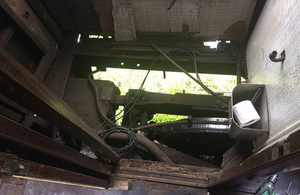Report 02/2018: Child nearly falling through a missing toilet floor, South Devon Railway
RAIB has today released its report into a child nearly falling through a missing toilet floor, South Devon Railway, 22 June 2017.

The missing floor (courtesy of South Devon Railway)
Summary
At around 13:15 hrs on Thursday 22 June 2017, a mother and her three-year-old child were travelling on a South Devon Railway train from Totnes (Riverside) to Buckfastleigh. Shortly after leaving Staverton station, while the train was travelling at about 20 mph (32 km/h), the child left his seat and went towards a toilet on the train, followed by his mother walking a short distance behind.
The child entered the toilet, and as the door opened and the child stepped through it, he fell forward because the floor was missing in the compartment he had entered. A more serious accident was only prevented by the quick reaction of the mother who grabbed the child’s arm and prevented him falling through the opening and onto the track below. The child suffered minor bruising, and both mother and child were shocked. The accident was reported immediately to the railway company, but the RAIB was not advised of what had happened until 25 June 2017.
In April 2017 the South Devon Railway had carried out a repair to this carriage. The location of the repair was difficult to gain access to and required the floor of the toilet cubicle to be removed. The railway’s management decided that the door would be secured and notices placed on the door, allowing the carriage to enter service with the toilet floor missing. The RAIB found that the method of securing the door was inadequate, so that over time the door became less secure to the extent it was possible for the child to open it. The risk associated with the absence of the toilet floor was not sufficiently appreciated nor adequately managed after the carriage was allowed to enter service. The RAIB also found that the South Devon Railway had no formal competence management assessment for staff involved in carriage maintenance. Both of these factors led to no-one detecting that the door had become unsecure.
The RAIB observed during the investigation that the South Devon Railway’s maintenance regime did not identify the extent of the deteriorating condition of the carriage structure, and the railway’s fitness to run process was not being correctly applied.
Recommendations
The RAIB has made one recommendation to the South Devon Railway to commission an independent review of the actions it has taken since the accident to address the deficiencies in its processes.
The RAIB believes that the investigation has also identified an important lesson likely to be applicable to other heritage railways, about applying appropriate standards for vehicle maintenance, to ensure that the examination regime which they have in place will identify the foreseeable deterioration of vehicles, before it reaches a stage that may affect safety.
Simon French, Chief Inspector of Rail Accidents said:
Britain’s heritage railways carry over 9 million passengers every year. People are travelling for pleasure, and they don’t expect any nasty surprises during their journey. When a mother, enjoying a happy day out with a small child, is suddenly faced with a life-threatening hazard, it is important to find out what went wrong. A door opened - and she had to grab hold of her little boy to stop him falling through a gaping hole in the floor of the carriage.
Operating even a small railway involves dealing with significant risks. Carriages built sixty or more years ago need looking after to keep them both clean and welcoming, and safe for passengers to ride in. Maintenance involves inspecting the condition of the vehicle, including the hidden parts that are hard to get at, at regular, appropriate intervals. It needs to be properly planned, and backed up with prompt action when something needs fixing.
In this case, the railway company took out the toilet floor, to get at and fix a leaking brake pipe. The engineers found a lot of previously undetected rust and rot, that was going to have to be dealt with. It seemed like a good idea to seal up the toilet door until the whole carriage could be got into the workshops for overhaul, but that was not easy to do securely, and the door came open.
Our investigation found that the railway’s safety management system was not operating properly, and had not been reviewed for many years. A flawed management structure contributed to poor decision-making. Staff were expected to do jobs which they were not really qualified for. We have recommended an independent review of how the railway manages the safety of its operations. I hope that the rest of the Heritage Railway sector will also look carefully at this report, and take action to make sure that the same thing cannot happen on their railways.
Notes to editors
- The sole purpose of RAIB investigations is to prevent future accidents and incidents and improve railway safety. RAIB does not establish blame, liability or carry out prosecutions.
- RAIB operates, as far as possible, in an open and transparent manner. While our investigations are completely independent of the railway industry, we do maintain close liaison with railway companies and if we discover matters that may affect the safety of the railway, we make sure that information about them is circulated to the right people as soon as possible, and certainly long before publication of our final report.
- For media enquiries, please call 01932 440015.
